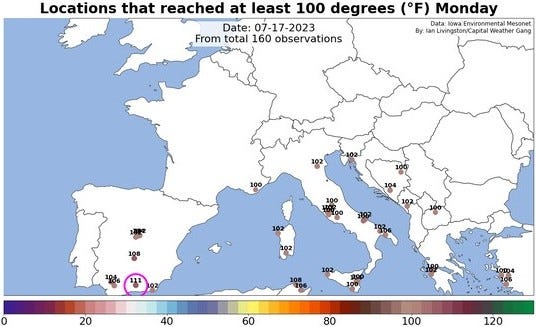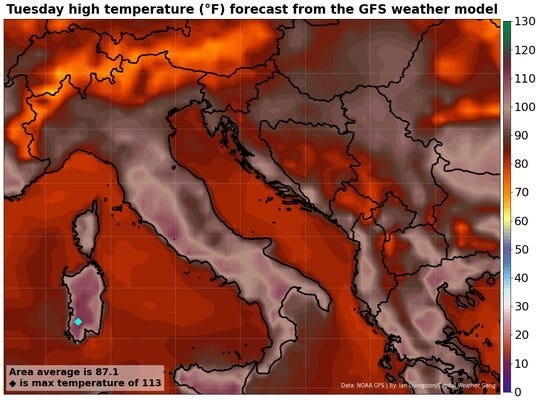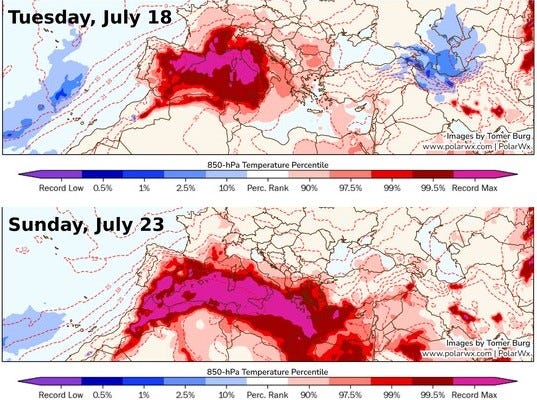
A powerful and prolonged heat wave is reaching its climax in Southern Europe on Tuesday and Wednesday, posing a threat to all-time temperature records across multiple countries and the continent as a whole.
Known as “Cerebrus” in Europe, this heat wave has brought scorching temperatures above 100 degrees Fahrenheit (38 degrees Celsius) across Spain, Italy, Greece, and neighboring nations throughout the past week.
The relentless and oppressive heat has triggered red alerts due to health hazards and has contributed to numerous significant wildfires. The extreme temperatures have even forced Greek authorities to close the Acropolis during peak sun hours on multiple occasions.
Italy, experiencing sporadic power outages due to high energy demand, is implementing innovative measures to promote heat safety. These measures include inviting celebrities to appear on television and deliver safety messages.
These sweltering temperatures follow a troubling report by the journal Nature, which revealed that over 60,000 individuals lost their lives in Europe during last summer’s heat waves.
Furthermore, record-breaking temperatures are scorching the southern United States, and our planet is currently enduring its hottest period in recorded history.
The heat so far

Southern Europe and the Mediterranean region, as well as parts of western Asia and northern Africa, endured scorching temperatures on Monday, marking a week-long heatwave that affected numerous countries.
The intense heat wave began last week with Greece, Bulgaria, and Turkey experiencing multiple days of temperatures surpassing 100 degrees Fahrenheit (37.8 degrees Celsius). Although the heat briefly retreated to the southern and eastern regions of Europe, it quickly returned and intensified.
On Sunday, temperatures soared to 106 degrees Fahrenheit (41.1 degrees Celsius) on the Italian island of Sardinia near the city of Cagliari. The heat expanded further on Monday, surpassing previous records. This upward trend is expected to persist on Tuesday.
According to weather historian Maximiliano Herrera, several locations in Spain, Italy, Bosnia, and France set new monthly heat records on Monday.
In Granada, located approximately 200 miles south of Madrid, temperatures reached a scorching 111 degrees Fahrenheit (43.9 degrees Celsius) on Monday afternoon. Ciudad Real, situated about 100 miles south of Madrid, experienced a high of at least 108 degrees Fahrenheit (42.2 degrees Celsius). Even the capital city of Madrid itself recorded a high of at least 106 degrees Fahrenheit (41.1 degrees Celsius).
The mercury also climbed to or exceeded the 100-degree mark in Montenegro and Bosnia, adding to the widespread impact of the heat wave.
The forecast

On Tuesday, Rome is anticipated to break its all-time heat record as temperatures are forecasted to surpass the previous high of 105 degrees Fahrenheit (40.6 degrees Celsius) set in August 2007.
The intensifying heat, coupled with dry weather, is exacerbating concerns over drought and wildfires in various parts of the region. Evacuations have been ordered for several towns near two significant fires in southern Greece, around Athens. Over the weekend, a forest fire on the Spanish island of La Palma compelled thousands of individuals to evacuate. Northwest Africa and Spain have experienced the most persistent heat and dry conditions.
This ongoing heatwave holds the potential to establish the highest temperature ever recorded in Europe. The European Space Agency highlighted that the current record was set on August 11, 2021, in Floridia, a town in the Sicilian province of Syracuse, where a temperature of 48.8°C (119.8°F) was recorded. However, it is expected that this record could be surpassed in the coming days, indicating an unprecedented level of heat for the continent.

Following the intense heatwave on Tuesday and Wednesday, there are indications that another record-breaking surge of heat will likely spread westward and northward across the Mediterranean later this week and into the weekend. Weather model simulations suggest that atmospheric temperatures a few thousand feet above the ground will remain historically high during both periods.
The risk of excessive heat is expected to persist throughout the remainder of the summer. Forecasts indicate above-normal temperatures across a significant portion of Europe. While northern and western regions of the continent have experienced cooler air in recent days, it is anticipated that heat will gradually expand northward, potentially reaching the British Isles by August.
Europe has frequently experienced episodes of exceptionally hot weather in recent years. Similar to Canada, Europe is located in a region that has witnessed a faster-than-average rate of warming due to human-caused climate change.
A study conducted in May highlighted that the probability of formerly rare heatwaves in Europe is projected to significantly increase as the climate continues to warm. In other words, the extreme heat waves observed in today’s climate will become more commonplace in the future, emphasizing the ongoing impact of climate change.
